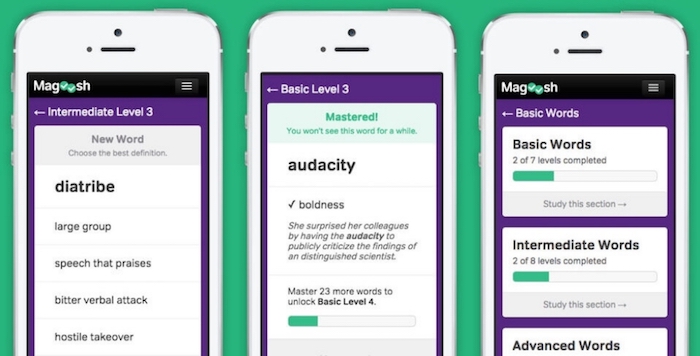The best apps to improve your vocabulary
By zcbepma, on 10 January 2019
Today student writer Priya tells us about apps that you can use to expand your vocabulary.
Whether you are a native English speaker or not, broadening your English language skills is something you will undoubtedly develop over the course of your lifetime.
Native speakers can always make an effort to improve their vocabulary by learning new words because what you say to others will affect them just like how they communicate will affect how you interpret something.
The English language is used everywhere and especially when doing a degree at university. Writing papers and essays along with doing presentations and speeches are all closely connected to language skills.
So, you’re probably wondering “How do I improve without it being boring?” – Well, I have the perfect answer; Apps.
Apps can help you improve your vocabulary skills and range from being just for fun to helping you during your GCSEs and/or A levels.
This app is super helpful if you need help with improving your vocabulary.
It is very user-friendly and quite easy to use. The app focuses on expanding your current vocabulary whilst helping you use it in everyday situations. You do this through lots of games and quizzes!
You can do a quiz every day and learn the English dictionaries most important words…can you guess how many there are?

As the name of the app suggests, this one is good if you want to learn along with friends! This app looks like a crossword puzzle and lets people test their vocabulary and skills a little bit like the way Scrabble does.
You have to get the highest score by competing against other people. You’ll have to stretch yourself with this one because it’s a brain puzzling game!

This app is great for people who love to learn new words. As the name of the app suggests – you learn a new word every single day! This app is great for those of you doing your GCSEs as it is designed by qualified English teachers.
You can explore some of the English languages most interesting, rare and unusual words. You can save the words into your own book and return to look back at them whenever you want. You can also share them with friends who are using the app!

This one is designed using a common tool that people use to revise: Flashcards! It is designed to act as a crash course in building your vocabulary.
This one is a little bit more challenging because it is designed for students taking graduate school exams, university entrance exams and professional advancement, however, if you’re finding that the other ones are too easy then who’s to say you can’t use this one!

Using a bunch of really complicated algorithms the app helps you learn English skills whilst learning your exact speech pattern. When it figures this out it will give you a range of scores, ranging from how clear you are to how many unique words you use.
It will then benchmark you against other students around your age! This is a great one if you want to improve something specific or if you like to log your progress using numbers!

A word from the writer:
 Hi my name is Priya! I study Biochemical Engineering and my area of expertise is in Bioprocessing of New Medicine with Business and Management. I am currently a 2nd Dan Black Belt ITF Tae-kwon-do instructor. I like to regularly train at UCL but also love to teach at my local club.
Hi my name is Priya! I study Biochemical Engineering and my area of expertise is in Bioprocessing of New Medicine with Business and Management. I am currently a 2nd Dan Black Belt ITF Tae-kwon-do instructor. I like to regularly train at UCL but also love to teach at my local club.
 Close
Close







